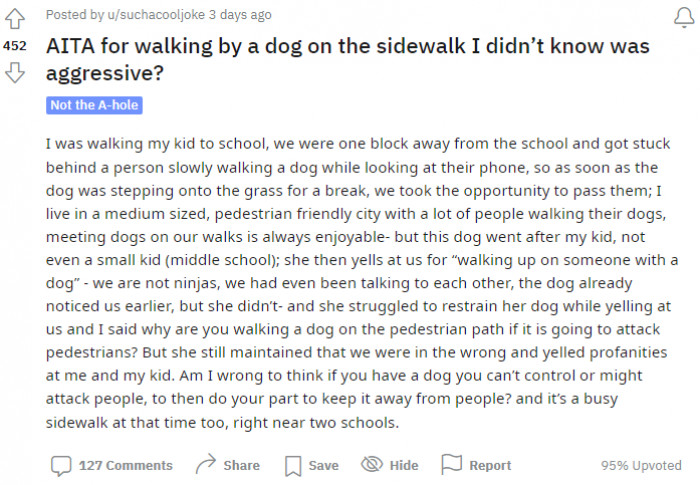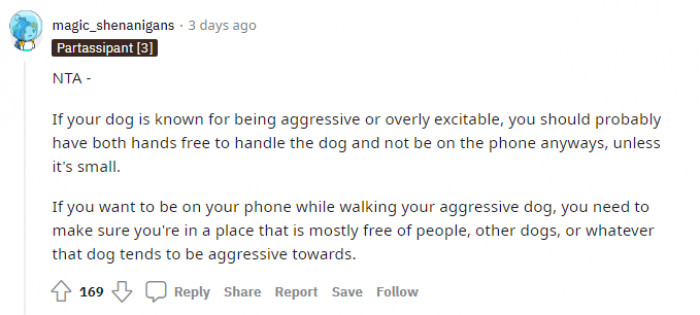Woman Gets Ripped By A Stranger For "Walking Up On Someone With A Dog"
It's pretty safe to assume that we were all taught as children to be wary of dogs we don't know. As much as we love all the doggos, it's generally a rule of thumb to never pet a dog without first checking with its owner and to always keep a safe distance when walking by a dog we aren't familiar with.
That being said, the dog's owner also has a responsibility to keep their pooch under control and to be respectful of people and other dogs that may be walking by. However, as one Reddit user recently found out, not everyone abides by the correct dog-walking etiquette.
Redditor u/suchacooljoke posted their story in the AITA (Am I The A**hole?) subreddit, asking, "AITA for walking by a dog on the sidewalk I didn't know was aggressive?" They explained that they were walking their child to school when they got stuck behind a person walking their dog slowly along the sidewalk.
They said the person was looking at their phone and paying no attention to their dog or their surroundings. Our OP and their child tried to pass the person when the dog stepped off the sidewalk onto the grass.
However, the Redditor says the dog "went after" her child, and the owner began yelling at them for "walking up on someone with a dog." So, was the OP in the wrong here, or was the dog's owner out of line?
The Reddit user explained that they had not snuck up on the person with the dog; they had been talking to each other, and the dog had already noticed them when they approached. The owner struggled to restrain their dog and swore at our OP and their child.
The OP asked the Reddit community for their opinions on the topic, and they didn't disappoint. Keep scrolling to see what they had to say.
The Redditor asked, "AITA for walking by a dog on the sidewalk I didn't know was aggressive?"
They explained that they were walking their child to school when they got stuck behind a person walking their dog slowly along the sidewalk. The Redditor says the dog "went after" her child, and the owner began yelling at them for "walking up on someone with a dog."
So, was the OP in the wrong here, or was the dog's owner out of line? The OP asked the Reddit community for their opinions on the topic, and they didn't disappoint.

Here's how people reacted.

"Sounds like this dog owner needs to put their phone away."

Understanding the Psychology Behind This Situation
The immediate reaction from the dog owner and the subsequent confrontation reflect a common human tendency to protect one's perceived territory, whether that be physical space or emotional safety.
According to research in social psychology, such defensive behaviors can stem from a sense of vulnerability, where individuals react strongly to perceived threats, even if those threats are not inherently dangerous.
"NTA!"

It's the owner's responsibility.

"You have the right to use public paths too."

From a behavioral perspective, this incident exemplifies how people often project their insecurities onto others. Dr. Ramani Durvasula, a clinical psychologist, states, "When individuals feel threatened or insecure, they may lash out at others as a way to deflect their own feelings of inadequacy." This reaction can escalate quickly, as heightened emotional responses often lead to conflicts. According to her insights on drramani.com, understanding these dynamics is crucial for managing interpersonal relationships effectively.
"It seriously pisses me off."

"Awful dog owner."

"You literally can't ask people not to walk past you."

The Role of Emotional Regulation
Emotional regulation is crucial in managing interpersonal conflicts, especially in situations involving pets, which many consider family.
Research from the National Institutes of Health shows that effective emotional regulation strategies can reduce aggressive responses during conflicts, helping individuals respond more thoughtfully rather than reactively.
Insufferable AH's.

"This person is just an awful owner."

The owner is liable.

Additionally, understanding the context can help de-escalate confrontations like this one. Studies indicate that framing the situation as a misunderstanding rather than a personal affront can lead to more constructive resolutions.
Practicing empathy by considering the other person's perspective can significantly alter the dynamic of such interactions.
Ah, those aggressive sidewalks.

"She should have been paying attention."

"It's their problem."

Practical Solutions for Conflict Resolution
To mitigate similar conflicts in the future, it’s beneficial to approach situations calmly and assertively. Techniques such as active listening and validating the other person's feelings can pave the way for more amicable discussions.
Conflict resolution training can empower individuals to express their needs without triggering defensive responses from others, fostering a more peaceful coexistence.
"Her fault, not yours."

He should be walked somewhere safer.

"Sidewalks are meant for walking on."

Furthermore, increasing awareness about dog behavior and body language can help owners respond more appropriately when their pets are involved in incidents.
Educational programs on responsible pet ownership can also promote understanding and reduce the likelihood of misunderstandings between dog owners and the public.
It's her, not you.

It's "her dog and her responsibility."

Not a valid excuse.

The Impact of Stress on Human Behavior
It's important to note that stress can exacerbate reactions in situations involving pets. Research indicates that heightened stress levels can decrease our capacity for empathy and increase impulsivity.
Understanding this connection can help individuals recognize when they might be overreacting and provide the opportunity to step back and reassess their responses.
What's your take on this Redditor's situation? Do you think they were in the wrong for walking up to the person with the dog, or was the dog owner irresponsible?
Either way, it certainly wasn't necessary for the dog owner to verbally abuse our OP and their child. It's just bad behavior, really.
We would love to hear your thoughts on this topic. You can share your opinions with us in the comment section below.
Lastly, community engagement initiatives that promote responsible pet ownership and interaction can significantly reduce conflicts. Studies show that social bonding activities can create a sense of shared responsibility and understanding among community members.
Such initiatives can lead to a more harmonious relationship between dog owners and non-dog owners alike.
Psychological Analysis
This situation highlights how people often react defensively when they feel their personal space or values are threatened. Emotional responses can be magnified in stressful contexts, making it essential to approach such interactions with a mindset geared towards understanding and resolution.
Analysis generated by AI
Analysis & Alternative Approaches
Behavioral specialists note that these reactions are common in high-stress environments, especially when pets are involved.
Understanding the underlying psychological mechanisms can help foster more effective communication and conflict resolution strategies.
Ultimately, enhancing our emotional intelligence and empathy can lead to healthier interactions, reducing the likelihood of similar confrontations in the future.



